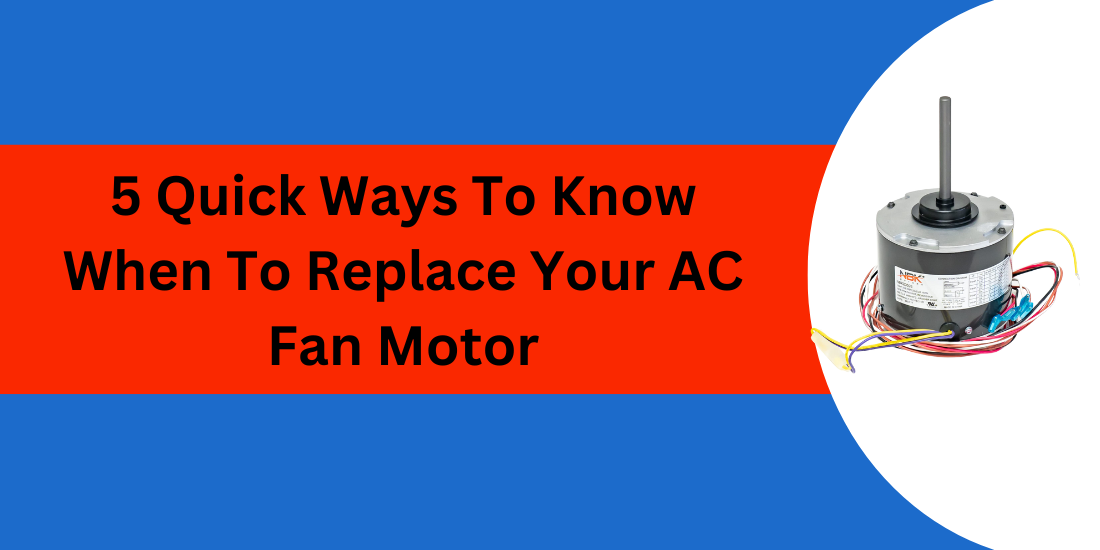
Air conditioning is essential for maintaining comfort during hot weather, and the fan motor plays a critical role in circulating cool air throughout your home. Over time, this key component can wear out, leading to reduced performance and potential system breakdowns. To keep your HVAC system operating well and save expensive repairs, it’s critical to recognize the early warning indications of a failed fan motor. This article highlights five quick ways to determine when it’s time to replace your AC fan motor, ensuring your home stays cool and comfortable year-round.
5 Signs It’s Time to Replace Your AC Fan Motor
Here are the key signs that indicate it’s time to replace your AC fan motor, ensuring your system continues to operate efficiently and reliably.
1. Weak or Inconsistent Airflow
Weak or irregular airflow is one of the first indicators that an AC fan motor is deteriorating. The fan motor powers the movement of air through your vents, ensuring even cooling throughout your home. If the motor begins to fail, you may notice:
- Uneven Cooling: Some rooms may feel cooler or warmer than others.
- Low Air Pressure: The air that emerges from the vents feels less forceful than normal.
- Intermittent Performance: The fan may stop and start irregularly.
What to Do
Check your air filters first, as clogged filters can also restrict airflow. If changing the filters doesn’t fix the issue, the fan motor can be the cause. A professional technician can confirm if the motor needs replacement.
2.Unusual Noises from the AC Unit
While AC systems typically operate quietly, a malfunctioning fan motor can produce unusual sounds that signal trouble. Common noises include:
- Grinding: Indicates worn-out bearings or internal motor damage.
- Humming: Suggests electrical issues or a motor struggling to start.
- Squealing: This may result from a misaligned or damaged belt.
Why It Matters
These noises are more than simply bothersome; they frequently signal mechanical issues that could get worse over time. Early intervention can stop more harm to your HVAC system.
Next Steps
Turn off the system right away and contact a specialist if you hear strange noises. The motor is probably nearing the end of its life and has to be replaced if it makes grinding or buzzing noises.
3.Fan Fails to Spin or Spins Slowly
The fan motor drives the blades that circulate air throughout your home. If the fan isn’t spinning or is moving slower than usual, it’s a clear sign that something is wrong.
Potential Causes
- Problems with Capacitors: The capacitor supplies the electrical shock required to turn on the motor. A malfunctioning capacitor may make it more difficult for the motor to run.
- Electrical Failures: The operation of the motor may be interfered with by bad wiring or blown fuses.
- Motor Overheating: Excessive strain or age can cause the motor to overheat and fail.
What to Look For
If the fan stops spinning entirely or moves sluggishly despite troubleshooting, it’s time to replace the motor. Ignoring this issue can strain the compressor, leading to costlier repairs.
4.Increased Energy Bills
A malfunctioning fan motor often works harder to maintain cooling, resulting in higher energy consumption. If your utility bills are unusually high despite consistent AC usage, the fan motor may be the culprit.
Why This Happens
As the motor ages or experiences wear, it becomes less efficient, consuming more electricity to perform the same tasks. Additionally, overheating or mechanical failure can exacerbate energy usage.
Solution
Have an inspection of your system if your energy expenses have increased without any apparent cause. It is possible to reduce energy expenses and enhance system performance by swapping out an inefficient motor for a new, energy-efficient model.
5.Frequent AC System Shutdowns
A failing fan motor can cause your AC system to shut down unexpectedly. Without the fan, air cannot circulate properly, leading to system overheating and triggering safety mechanisms.
Signs to Watch For
- Regular Cycling: The system cycles more frequently than normal.
- Error Codes: Modern HVAC systems may display diagnostic error codes indicating motor issues.
- Overheating: Components, including the compressor, may overheat due to inadequate airflow.
Act Quickly
Regular shutdowns might harm the compressor and other components of your HVAC system. If a technician identifies the fan motor as the cause, replacing it immediately can prevent further damage and higher repair costs.
The AC fan motor is essential to your HVAC system’s performance. Early problem-solving can guarantee reliable cooling and avoid expensive repairs. You should speak with a qualified technician right away if you think the motor is failing. Its timely replacement maintains the comfort of your house, increases system longevity and restores efficiency. Being proactive guarantees consistent comfort and dependable performance all year long.







